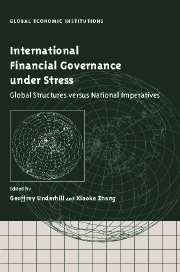Book contents
- Frontmatter
- Contents
- List of figures
- List of tables
- List of contributors
- Acknowledgements
- Introduction: global market integration, financial crises and policy imperatives
- I Financial globalisation and policy responses: concepts and arguments
- 1 Reform of the international financial architecture: what has been written?
- 2 Costs and benefits of financial globalisation: concepts, evidence and implications
- 3 Capital controls: the neglected option
- 4 Global structures and political imperatives: in search of normative underpinnings for international financial order
- II Globalisation, financial crises and national experiences
- III Private interests, private–public interactions and financial policy
- IV Building the new financial architecture: norms, institutions and governance
- Conclusion: towards the good governance of the international financial system
- Index
3 - Capital controls: the neglected option
Published online by Cambridge University Press: 22 September 2009
- Frontmatter
- Contents
- List of figures
- List of tables
- List of contributors
- Acknowledgements
- Introduction: global market integration, financial crises and policy imperatives
- I Financial globalisation and policy responses: concepts and arguments
- 1 Reform of the international financial architecture: what has been written?
- 2 Costs and benefits of financial globalisation: concepts, evidence and implications
- 3 Capital controls: the neglected option
- 4 Global structures and political imperatives: in search of normative underpinnings for international financial order
- II Globalisation, financial crises and national experiences
- III Private interests, private–public interactions and financial policy
- IV Building the new financial architecture: norms, institutions and governance
- Conclusion: towards the good governance of the international financial system
- Index
Summary
Why don't emerging-market economies make more use of capital controls? Not long ago, in the wake of Asia's great financial crisis, limitations on capital mobility appeared about to make a comeback. At the intellectual level, scholars began to accord new respectability to the old case for controls as an instrument of monetary governance. At a more practical level, one country – Malaysia – imposed comprehensive restraints and, with seeming success, survived to tell the tale. As I wrote soon after the crisis broke: ‘The tide … is starting to turn. Once scorned as a relic of the past, limits on capital mobility could soon become the wave of the future.’ Yet in reality governments in the newly industrialising economies still hesitate to raise or restore impediments to the free flow of capital. Controls remain the neglected option. The question is: why?
Elsewhere, I have suggested that the explanation has much to do with the prominent role of the United States, the still dominant power in international finance. Washington, both directly and through the IMF, has brought its considerable power to bear to resist any significant revival of controls. Reflection suggests, however, that international politics is at best only part of the story; domestic politics too must be involved, in a mutually reinforcing interaction with the pressure of outside forces. The purpose of this chapter is to highlight the critical domestic side of the story.
- Type
- Chapter
- Information
- International Financial Governance under StressGlobal Structures versus National Imperatives, pp. 60 - 76Publisher: Cambridge University PressPrint publication year: 2003
- 2
- Cited by



